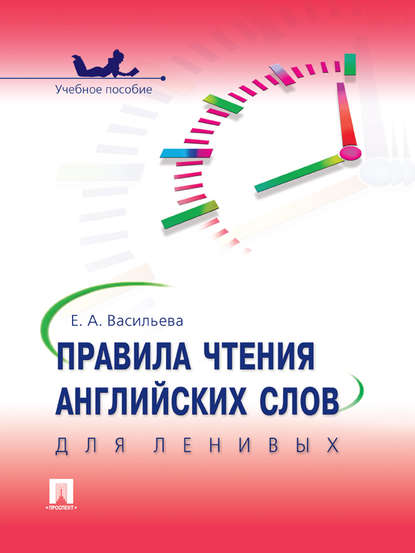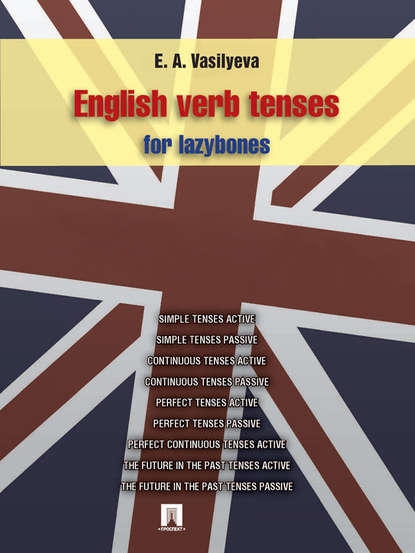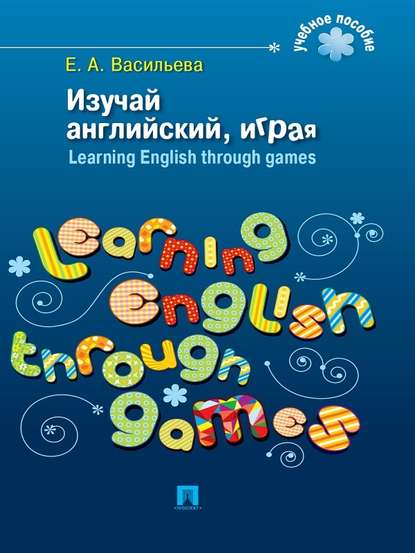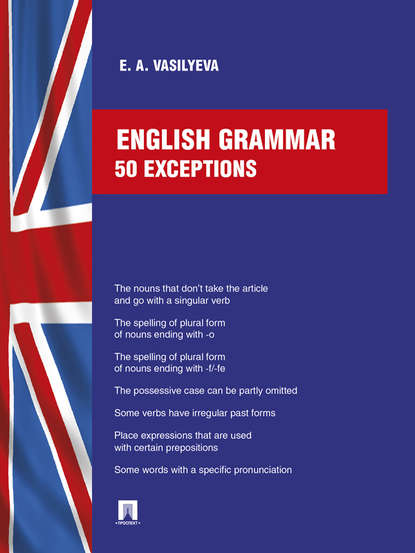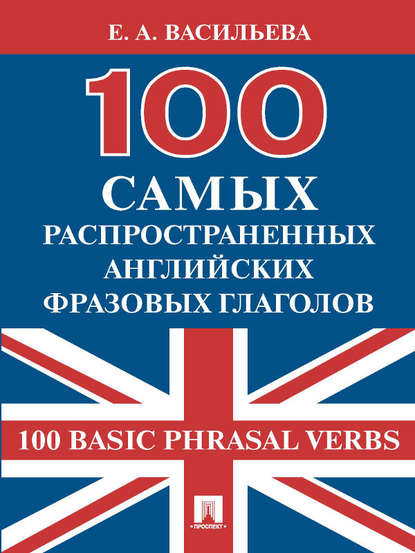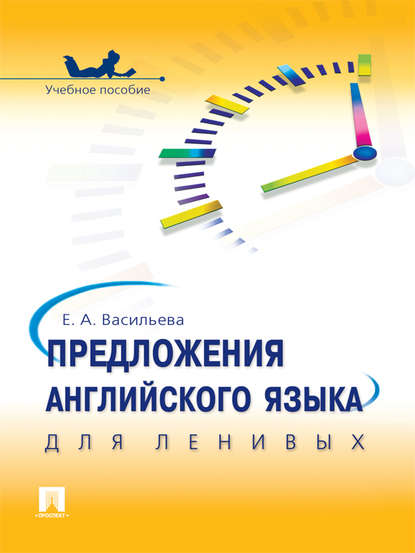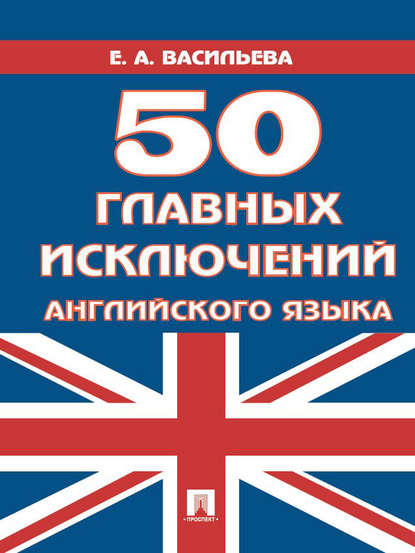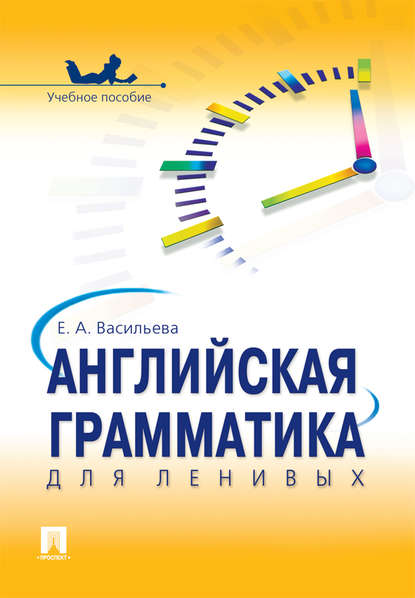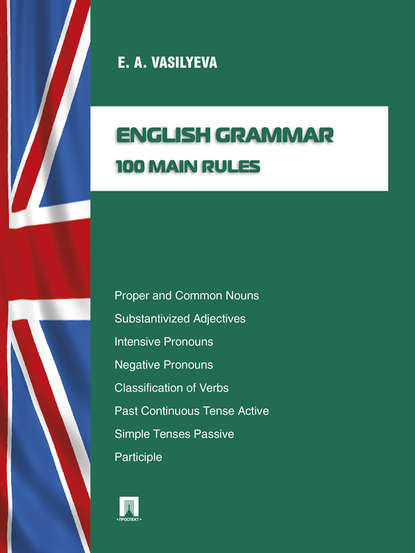
Полная версия
English grammar: 100 main rules

E. A. Vasilyeva
English grammar: 100 main rules

ebooks@prospekt.org
RULE 1. Proper and Common Nouns












Positive Degree of Adjectives
1. Description
a busy street, a clever dog, a dull day, an expensive ring, a good attitude, a jealous man, an important signal, a weak accent, young people
Note
Qualitative adjectives can be modified by adverbs of degree.
a dreadfully dull day, extremely hot weather, a fairly large message, a hugely important signal, an immenselyfamous picture, incredibly useful advice, an intensely busy street, a little/a bit expensive ring, a rather good attitude, a reasonably weak accent, quite an interesting list, a slightly somber event, a too jealous husband, an unusually clever dog, very young people
2. Comparison
1) Equality
as + adjective + as
The white kitten is as cute as the grey one.
Playing games is as important as studying.
2) Inferiority
not so + adjective (+ as)
His idea is not so stupid.
The view did not turn to be so splendid as we had expected.
half as + adjective (+ as)
Jimmy is half as tall as Jonny.
Our house is half as big as the neighbours'.
3) Superiority
twice (three times) as + adjective (+ as)
The way was twice as long as yesterday.
Olivia's typing speed is three times as fast as Andrew's.
Comparative Degree of Adjectives
The comparative degree demonstrates the difference between two objects.
1) Superiority
– Most one- and two-syllable adjectives form the comparative degree by adding – er ending.
adjective + – er
clever – cleverer, dull – duller, large – larger, weak – weaker, young – younger
Apple juice is sweeter than orange juice.
These tickets are cheaper than those ones.
Note
– Adjectives ending in – y change the – y into – i and add – er.
busy – busier, pretty – prettier, lazy – lazier, funny – funnier, juicy – juicier
Cf.: shy – shyer, sly – slyer, grey – greyer
– One-syllable adjectives with a short vowel followed by a consonant double this consonant and add – er.
big – bigger, hot – hotter, fat – fatter, thin – thinner
– Several two-syllable adjectives and all three- (and more) syllable adjectives form the comparative degree with more.
more + adjective
more expensive, more famous, more important, more interesting, more profitable, more somber, more useful
The new hairdo makes Andrew more handsome.
Time is more valuable than money.
2) Inferiority
less + adjective
less busy, less clever, less hot, less expensive, less famous, less important, less interesting
This way is less easy than the way Andrew offers.
I prefer less dangerous driving.
Note
Use certain adverbs to enhance the meaning of comparative adjectives.
far/much/a lot
slightly/a little/a bit
Olivia is far prettier than her sister.
This will sound a bit more polite.
Note
It is possible to use the double comparison of adjectives combined with change-of-state verbs.
adjective-er + and + adjective-er
more adjective + and + more adjective
The days are getting shorter and shorter.
The word is becoming more and more ridiculous.
Note
Use the following combination to emphasize the inevitable consequence in degree change of comparative adjectives.
The adjective-er, the adjective-er
The more adjective, the more adjective
The sweeter products are, the unhealthier they are.
The more luxurious goods are, the more expensive they are.
Superlative Degree of Adjectives
The superlative degree demonstrates differences among three or more objects.
1) Superiority
– Most one- and two-syllable adjectives form the comparative degree by adding – est ending.
the adjective + – est
clever – the cleverest, dull – the dullest, large – the largest, weak – the weakest, young – the youngest
– Several two-syllable adjectives and all three- (and more) syllable adjectives form the comparative degree with most.
the most + adjective
the most expensive, the mostfamous, the most important, the most interesting, the most profitable, the most somber, the most useful
2) Inferiority
the least + adjective
the least busy, the least clever, the least hot, the least expensive, the least famous, the least important, the least interesting
The least strong cheese will do for this sort of wine.
What are the least prestigious jobs?


Substantivized Adjectives
the + adjective
1) substantivized adjectives denote a whole class of persons characterized by a specific feature. In most cases such adjectives agree with a plural verb.
the elderly, the handicapped, the lonely, the needy
Olivia's aunt works in school for the blind.
The rich also cry.
2) substantivized adjectives may as well refer to the whole nation.
the Japanese, the English, the Dutch
The ancient Chinese first invented paper.
The Welsh try to preserve their language and culture.
3) A number of substantivized adjectives even take the plural ending – s, which let them pass into the category of nouns.
the marines, the moderns, the nobles, the regulars, the Russians
The Conservatives are leading in the polls.
If you want to see the true measure of a man, watch how he treats his inferiors, not his equals.
4) substantivized adjectives indicate abstract notions. such adjectives agree with a singular verb.
the future, the past, the present, the plural, the singular, the unknown, the unreal, the variable, the visible
The obvious is fabulous, but the fabulous is obvious.
You should use the Future Simple in this sentence.
RULE 11. Syntactic Functions of AdjectivesSyntactic Functions of Adjectives
1. Attribute
We liked that warm meeting.
I hear some pleasant music.
Note
There is a particular order for adjectives to describe a noun.
Opinion – Size – Shape – Colour – Pattern – Age
– Origin – Material – Purpose + Noun
a clever young British professor
two nice tiny round black old metal musical boxes
that beautiful swift white new sailing boat
2. Predicate
The meeting was warm.
Your mother looks sad.
I feel good about the offer.
A predicate adjective follows a linking verb (to be, to seem, to appear, to look, to taste, to smell, to feel, to sound), but it refers to the subject of the sentence.
3. Subject and Object (Substantivized adjectives)
The unemployed demanded concrete programs of public works.
The young should help the old.
RULE 12. Cardinal and Ordinal Numerals


Fractional Numerals
Common fraction
The numerator is a cardinal number; the denominator is an ordinal number.
1/2 – one (a) half
1/3 – one (a) third
1/4 – one (a) quarter
1/5 – one (a) fifth
1/6 – one (a) sixth
If the numenator is more than one, then the denominator is used in plural.
2/3 – two thirds
3/4 – three quarters
5/6 – five sixths
Decimal fraction
Each digit is pronounced separately.
25. 105 – two five point one nought five
0.746 – nought point seven four six
Operations with Numerals
1. Addition
1+2=3 – one plus two is (equals) three; 1, 2 – the addends, 3 – the sum
2. Subtraction
3–2=1 – three minus two is (makes) one; 3 – the minuend, 2 – the subtrahend, 1 – the difference
3. Multiplication
3*2=6 – three multiplied by two/twice three is six; 3 – the multiplicand, 2 – the multiplier, 6 – the product
4. Division
6:2=3 – six divided by two is three; 6 – the dividend, 2 – the divisor, 3 – the quotient
RULE 14. Numerals for Time Expressions
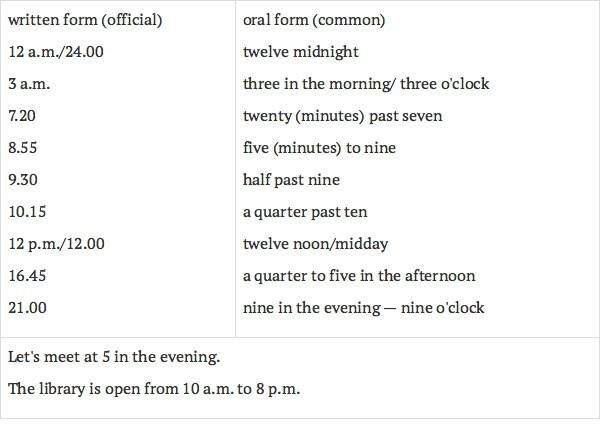
Syntactical Functions of Numerals
1. Attribute
Do you know the seven wonders? This is Andrew's third trip abroad.
2. Subject
Four of them didn't join us.
2004, 2008 and 2012 are leap years.
3. Predicative
They were the first.
It's five o'clock.
4. Object
How many apples has he eaten? He's eaten three.
Show me those two, please.
RULE 16. Personal Pronouns



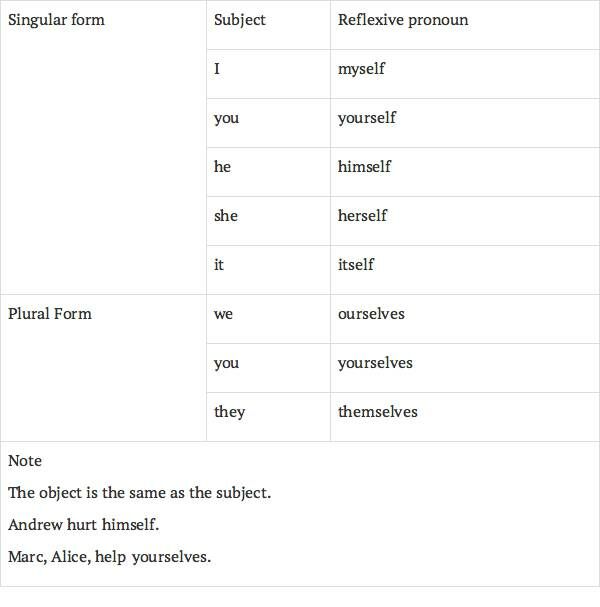

Note
Intensive pronouns do not substitute nouns, but intensify their meaning.
You must make that choice yourself.
Andrew repaired the bike himself.
We want to go there ourselves.
RULE 21. Demonstrative PronounsDemonstrative Pronouns
Demonstrative pronouns point to a certain object or person that can be either near or far in distance or time.

Note
1) Attribute
This situation is incredible.
We met that man on the station.
Would you quit your job under these circumstances?
Those shoes were so cute!
That girl has such a voice!
Such rules usually take effect.
They work at the same department.
Why are you asking me the very same questions?
It's possible to use demonstrative pronouns before the word one.
These apples are sweeter than those ones.
Andrew is an intelligent young man. Yes, he is such one.
That's the same one I've been looking for!
The demostrative pronoun may be positioned before the adjective that refers to the same noun.
This pretty girl is my sister.
What are these strange conclusions?
It's such a wonderful life.
It's always the same old story.
2) The demonstrative pronoun can also be used in place of nouns.
– Subject
This must not continue.
Those were the days.
– Object
Will you take this?
Don't tell them that.
Andrew can't work with those.
RULE 22. Classification of Indefinite Pronouns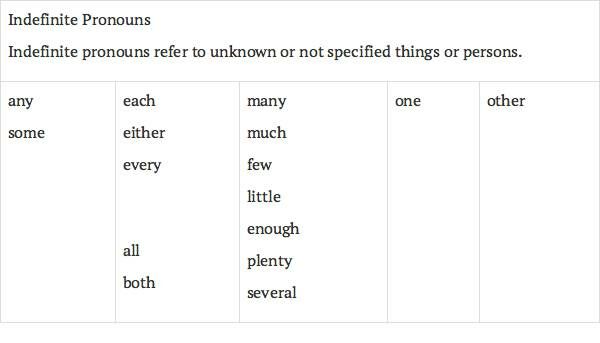
some
– statements
I need some information about language courses.
Some of the m istakes were silly.
– offers and suggestions
Would you like some tea?
Shall I bring some refreshments?
– requests
Where can I get some paper?
Could you give us some examples?
any
– negative sentences
Olivia didn't know any of them.
It doesn't make any sense.
– questions
Have you got any questions?
Did any of Andrew's friends call him?
– if-clauses
I can lend her my cell phone if there's any need.
If you come across any problems, please, report us.
– statements
Contact any of our assistants.
Any answer will do.

Somebody phoned you ten minutes ago.
Would you like something to eat?
Can we take something to make notes on?
You may invite anyone.
Are they waiting for anybody?
Andrew has not found anything.
RULE 24. Each, Every, Eithereach
– only with countable nouns
– refers to two or more things or persons that should be regarded separately and individually
There were cars parked on each side of the street.
She kissed each of her children.
– agrees with a singular verb
There are four apartments in our building. Each of the apartments has its private entrance.
Each item was checked.
– However, if the pronoun each follows the plural subject, it agrees with the plural verb.
They each do their share of work.
I have two people in the office and we each have our own email.
every
– only with countable nouns
– refers either to indefinite number of things/persons or to a group of things/persons considered as a whole.
We could see every star in the night sky.
Every player in the team should cooperate.
– with modifiers such as nearly, almost, practically
Olivia knows almost every neighbour.
Practically every problem has practical solutions.
– with time words such as minute, hour, day
There's a bus every ten minutes.
Every morning Andrew goes jogging in the park.
– makes compound pronouns with – body, – one, – thing
Everybody likes presents.
They invited everyone but James and Karen.



